Filter by

Emergence of Cross-innovation Systems Audiovisual Industries Co-innovating w…
This book combines economic studies of innovation systems with studies of mediatisation, media convergence, trans- and cross-media and with other approaches within media and culture studies. It elaborates on a new concept, cross-innovation, referring to co-innovation and convergence processes taking place between different sectors of digital service economies. The proposition is that digitisati…
- Edition
- -
- ISBN/ISSN
- 9781787699779
- Collation
- -
- Series Title
- -
- Call Number
- -

Exposed Living with scandal, rumour, and gossip
This book illuminates the personal experience of being at the centre of a media scandal. The existential level of that experience is highlighted by means of the application of ethnological and phenomenological perspectives to extensive empirical material drawn from a Swedish context. The questions raised and answered in this book include the following: How does the experience of being the prota…
- Edition
- -
- ISBN/ISSN
- 9789198376845
- Collation
- -
- Series Title
- -
- Call Number
- -
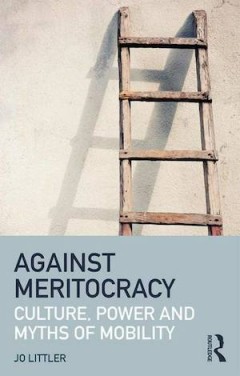
Against Meritocracy: Culture, power and myths of mobility
In this book Jo Littler argues that meritocracy is the key cultural means of legitimation for contemporary neoliberal culture – and that whilst it promises opportunity, it in fact creates new forms of social division. Against Meritocracy is split into two parts. Part I explores the genealogies of meritocracy within social theory, political discourse and working cultures. It traces the dramati…
- Edition
- -
- ISBN/ISSN
- 9781138889552
- Collation
- -
- Series Title
- -
- Call Number
- -
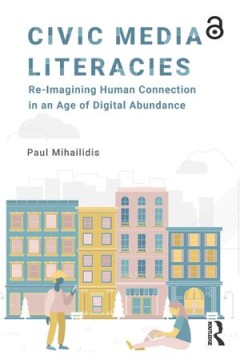
Civic Media Literacies Re-Imagining Human Connection in an Age of Digital Ab…
Civic life today is mediated. Communities small and large are now using connective platforms to share information, engage in local issues, facilitate vibrant debate, and advocate for social causes. In this timely book, Paul Mihailidisexplores the texture of daily engagement in civic life, and the resources—human, technological, and practical—that citizens employ when engaging in civic actio…
- Edition
- -
- ISBN/ISSN
- 9781138695825
- Collation
- -
- Series Title
- -
- Call Number
- -

Zootechnologies A Media History of Swarm Research
Swarming has become a fundamental cultural technique related to dynamic processes and an effective metaphor for the collaborative efforts of society. This book examines the media history of swarm research and its significance to current socio-technological processes. It shows that the hype about collective intelligence is based on a reciprocal computerization of biology and biologization of com…
- Edition
- -
- ISBN/ISSN
- 9789462986206
- Collation
- -
- Series Title
- -
- Call Number
- -
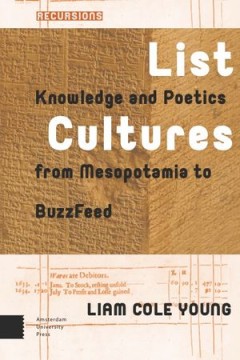
List Cultures Knowledge and Poetics from Mesopotamia to BuzzFeed
We live in an age of lists, from magazine features to online clickbait. This book situates the list in a long tradition, asking key questions about the list as a cultural and communicative form. What, Liam Cole Young asks, can this seemingly innocuous form tell us about historical and contemporary media environments and logistical networks? Connecting German theories of cultural techniques to A…
- Edition
- -
- ISBN/ISSN
- 9789462981102
- Collation
- -
- Series Title
- -
- Call Number
- -
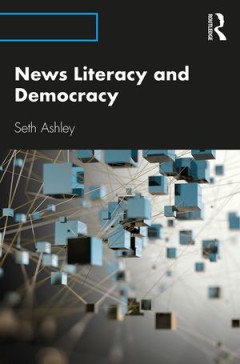
News Literacy and Democracy
News Literacy and Democracy invites readers to go beyond surface-level fact checking and to examine the structures, institutions, practices, and routines that comprise news media systems.This introductory text underscores the importance of news literacy to democratic life and advances an argument that critical contexts regarding news media structures and institutions should be central to news l…
- Edition
- -
- ISBN/ISSN
- 9781138625051
- Collation
- -
- Series Title
- -
- Call Number
- -
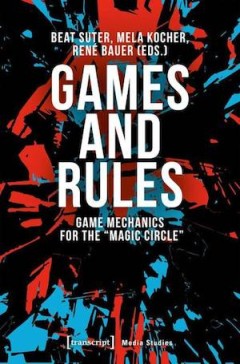
Games and Rules Game Mechanics for the »Magic Circle«
Why do we play games and why do we play them on computers? The contributors of »Games and Rules« take a closer look at the core of each game and the motivational system that is the game mechanics. Games are control circuits that organize the game world with their (joint) players and establish motivations in a dedicated space, a »Magic Circle«, whereas game mechanics are constructs o…
- Edition
- -
- ISBN/ISSN
- 9783837643046
- Collation
- -
- Series Title
- -
- Call Number
- -
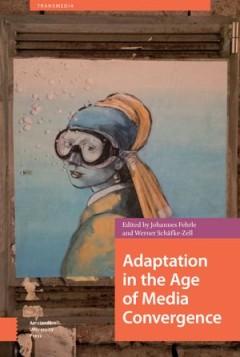
Adaptation in the Age of Media Convergence
This collection considers new phenomena emerging in a convergence environment from the perspective of adaptation studies. The contributions take the most prominent methods within the field to offer reconsiderations of theoretical concepts and practices in participatory culture, transmedia franchises, and new media adaptations. The authors discuss phenomena ranging from mash-ups of novels and Yo…
- Edition
- -
- ISBN/ISSN
- 9789462983663
- Collation
- -
- Series Title
- -
- Call Number
- -

Right Across the World: The Global Networking of the Far-Right and the Left R…
In a post-Trump world, the right is still very much in power. Significantly more than half the world’s population currently lives under some form of right-wing populist or authoritarian rule. Today’s autocrats are, at first glance, a diverse band of brothers. But religious, economic, social and environmental differences aside, there is one thing that unites them - their hatred of the libera…
- Edition
- -
- ISBN/ISSN
- 9781786808554
- Collation
- -
- Series Title
- -
- Call Number
- 320 LEF r
 Computer Science, Information & General Works
Computer Science, Information & General Works  Philosophy & Psychology
Philosophy & Psychology  Religion
Religion  Social Sciences
Social Sciences  Language
Language  Pure Science
Pure Science  Applied Sciences
Applied Sciences  Art & Recreation
Art & Recreation  Literature
Literature  History & Geography
History & Geography